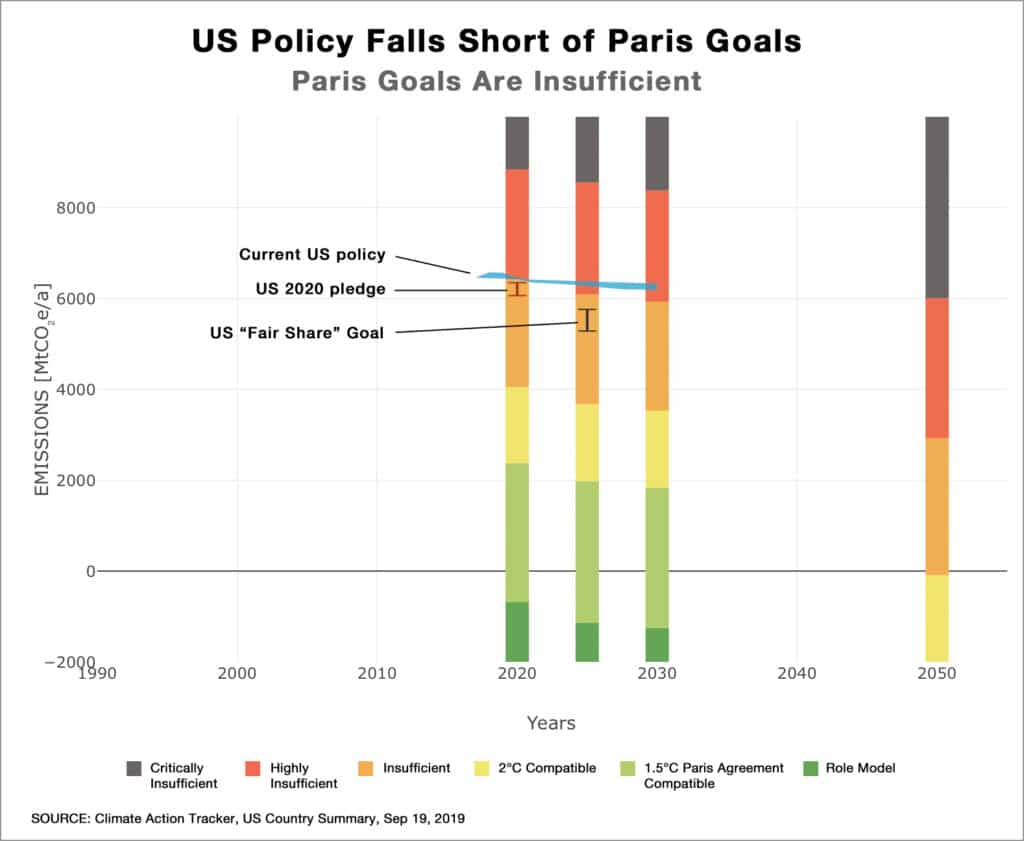
Climate change is happening now, impacting us faster and sooner than some had predicted. It is already proving to be disruptive, causing damage to whole communities, destroying lives, changing ecosystems, and producing mass migrations and extinctions of species. The specific damages vary by region of the country, but recent reports indicate the costly impacts of climate change are no longer only predictions of the future. Whether or not you believe in climate change, those predictions are now also descriptions of the present.
Despite the ratification of the Paris Climate Agreement in 2015, progress around the world to reduce or eliminate the emissions of greenhouse gases (GHGs) has been limited. According to a report from National Geographic and Climate Action Tracker, global carbon emissions rose 1.7 percent in 2017 and 2.7 percent in 2018.
In the US, the Trump administration is rolling back existing regulations on GHGs, threatening lawsuits against automakers and the state of California for efforts to reduce emissions, and has promised to withdraw from the Paris Agreement. Nevertheless, numerous cities and states and businesses across the country are taking steps to reduce their emissions and develop resiliency plans that may help them to adapt to the changing climate. Climate Action Tracker reports that their emissions reductions efforts could bring the US “within striking distance of the US Paris Agreement commitment”.

Costs of adaptation, however, may be significant. The estimate to build a sea wall just to protect Florida’s Miami-Dade county from rising waters in the Atlantic Ocean is $3.2 billion. And that estimate was determined before the recent report that sea levels are rising faster due to a faster-than-predicted melting in Antarctica. Without a coordinated effort from the federal government, the process of securing our communities against the changes to come and achieving comprehensive reductions in greenhouse gas emissions to minimize those changes will be slower and potentially lacking in global impact.
As some have pointed out, there is opportunity amidst this rapid change, opportunity for badly needed innovations in technologies to take GHGs out of the air, to make renewable and nuclear energies more cost-effective and safe and environmentally sound, and to adapt to the many changes to come. Not only will these endeavors require substantial financial investments, they also demand that we as individuals begin to change our ways and our choices when innovations offer us viable alternatives.
In the last year, we have begun to see a mass movement for action on climate change gain traction, likely aided by unprecedented climate change-related devastation from wildfires in the west and the increased frequency of extreme storms and flooding in the midwest and the east:
Grassroots Youthful calls for action, sparked by a teenager from Sweden, have spread around the globe and here in the US, reminding everyone that it’s their future at stake. The courageous speech by 16-year-old Greta Thundberg at the United Nations on September 23 drove home the fears and anger of the next generation.
Politics The Green New Deal, regardless of its merits, re-started the political conversation around climate change and pushed Senate Majority Leader Mitch McConnell, a long-time climate change denier, to admit that it’s real. This breakthrough opens the door to substantive policy discussions on mitigation and adaptation.
Business The Business Roundtable has reversed its decades-long position on the purpose of business and acknowledged its responsibilities to society, committing to, among other things, “embracing sustainable practices across our businesses.”
News Media The media has finally recognized that it is their job to remain focused on such a critical problem. More than 250 media outlets – a number that is growing – have joined together for Covering Climate Now, a project started by the Columbia Journalism Review and The Nation.
Sources
Climate Action Tracker, USA Country Summary, Sep 19, 2019, https://climateactiontracker.org/countries/usa/, accessed Sep 26, 2019
The Business Roundtable, “Statement on the Purpose of a Corporation”, Aug 2019, https://opportunity.businessroundtable.org/ourcommitment/, accessed Sep 30, 2019
Covering Climate Now, co-published by The Nation and the Columbia Journalism Review, https://www.coveringclimatenow.org, accessed Sep 30, 2019
PBS News Hour, “Greta Thunberg’s full speech to world leaders at UN Climate Action Summit”, YouTube, Sep 23, 2019, https://www.youtube.com/watch?v=KAJsdgTPJpU, accessed Sep 30, 2019
Jess Nelson, “Sea-Level Rise in Miami-Dade Could Cost $3.2 Billion by 2040”, Miami New Times, Jun 20, 2019, https://www.miaminewtimes.com/news/climate-change-study-says-sea-level-rise-could-cost-miami-dade-32-billion-for-seawall-construction-11201008, accessed Sep 3, 2019
MIT Technology Review, “Global sea levels are rising even faster than predicted, warns the UN’s climate committee”, Sep 25, 2019, https://www.technologyreview.com/f/614429/global-sea-levels-are-rising-even-faster-than-predicted-says-uns-climate-committee/, accessed Oct 11, 2019
Have a Suggestion?
Know a leader? Progress story? Cool tool? Want us to cover a new problem?

